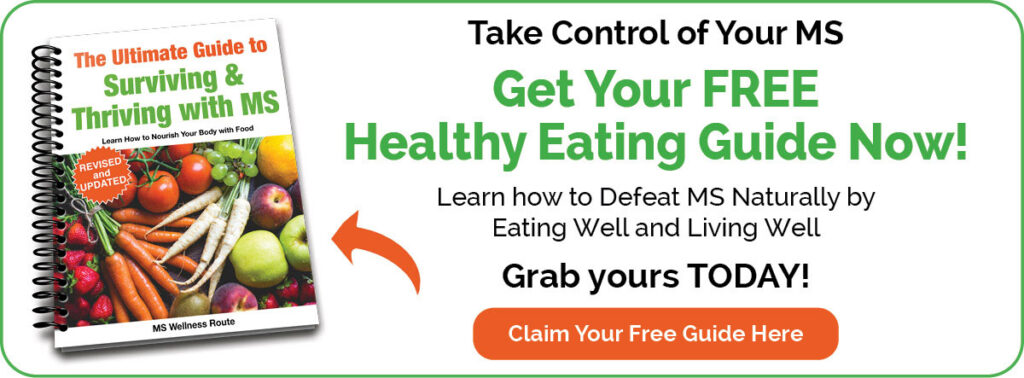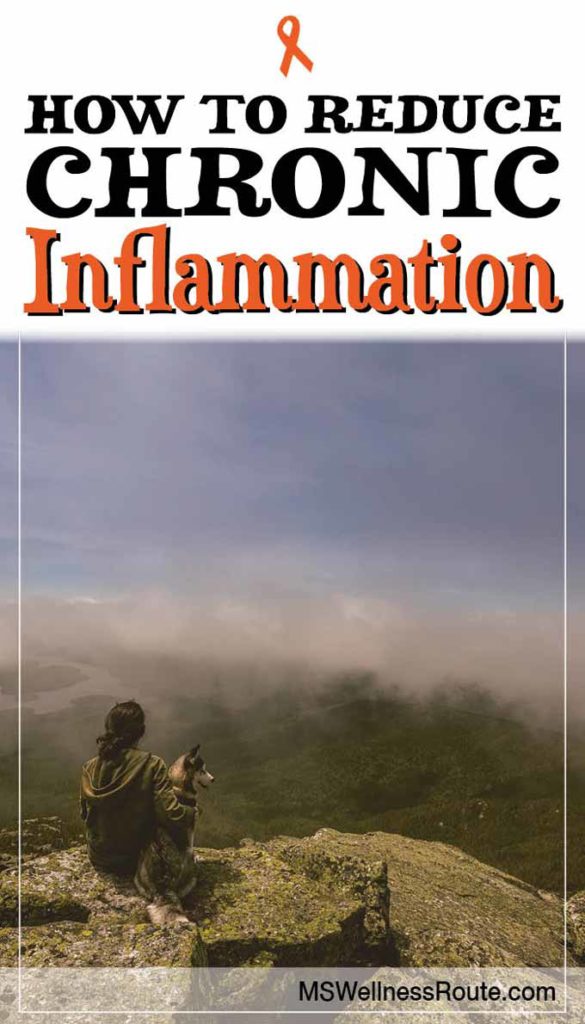Last Updated on December 7, 2023 by Cathy

Chronic inflammation causes autoimmune diseases such as multiple sclerosis (MS). It damages your heart, brain, nervous system, and other organs. Paying attention to your body and removing the causes will reduce chronic inflammation. This will allow your body to begin healing from the damage.
Inflammation isn’t always a bad thing. Acute inflammation protects the body like after a cut, sprained ankle, or a sore throat. It’s short-term and calms down after the injured area is better. It’s the body’s natural response to fixing the damaged cells. It’s long-term chronic inflammation that causes problems. Such as obesity, heart disease, autoimmune diseases, and some cancers.
Get a free “Quick Guide to Remove Inflammation” at the bottom of this story.
What Is Chronic Inflammation
Chronic inflammation, also called systemic inflammation, happens after a long period. It’s caused by many factors – poor diet, infections, environmental toxins, and stress. After months and even years, the body begins to see this as a threat. It sends an inflammatory response that begins attacking its internal organs.
MS is inflammation of the central nervous system. Heart disease is inflammation of the arteries. Type 1 Diabetes is inflammation of the pancreas. Instead of looking at each symptom, it’s time to look at the body as a whole.
Help your body by reducing inflammation and stopping the damage.
Inflammation Causes:
- Acne
- Allergies
- Asthma
- Autoimmune Diseases (MS, Alzheimer’s, fibromyalgia, lupus, etc.)
- Cancer
- Depression
- Digestive Issues
- Heart Disease
- Obesity
- Sleep Disorders
Anti-inflammatory Diet
First, you want to stop eating foods that are causing inflammation. Also, stop eating any foods causing you an allergy or sensitivity reaction. Common sensitivities are dairy, eggs, gluten, nuts, peanuts, soy, and shellfish.
Inflammatory Foods To Avoid:
- Alcohol, it’s hard on the liver
- Artificial Additives (colors, flavor enhancers, preservatives, stabilizers, etc.)
- Artificial Sweeteners (aspartame, Nutrasweet, saccharin, Splenda, Sweet ‘N Low, etc.)
- Conventional Grain-fed Meats
- Dairy
- Fast Foods
- Grains, they contain lectins and phytates which are hard to digest
- Gluten, it’s on many items, always read the labels!
- GMO’s (corn, soy, wheat)
- Iodized Salt
- Processed Meats (hot dogs, lunch meats, sausage, etc.)
- Refined Sugar
- Trans Fats (baked goods, margarine, shortening)
- Vegetable Oils (canola, corn, safflower, soybean, sunflower, etc.)
Anti-inflammatory Foods To Include
Second, you’ll want to include anti-inflammatory foods to help your body heal faster. This will also help seal your leaky gut. A leaky gut is when your intestines break down allowing toxins to enter your bloodstream.
You need to eat a nutrient-dense diet with a wide variety of vegetables as your main meal. Include fruits, wild-caught fish, grass-fed meats, and pasture-raised poultry. Buy organic as much as possible to avoid pesticides, growth hormones, and antibiotics. If you have a hard time buying organic produce check out EWG’s Dirty Dozen List.

Top anti-inflammatory foods to include:
- Beets
- Bone Broth
- Broccoli
- Coconut Oil
- Dark Leafy Greens (chard, kale, spinach, etc.)
- Extra-Virgin Oil
- Garlic
- Ginger
- Salmon
- Turmeric
- Wild blueberries
Omega Fats
The standard American diet includes too many omega-6 fatty acids which cause inflammation. Omega-6s are in vegetable oils, and fast food restaurants are the worst for using these oils.
You’ll need to add more omega-3s due, to their anti-inflammatory. They promote a healthy heart and brain function, and for rebuilding the myelin sheath. This doesn’t mean cutting out omega-6s, it only means lowering omega-6s and increasing omega-3s for a good balance.
Top Sources For Omega-3s:
- Avocados
- Chia Seeds
- Flaxseeds
- Mackerel
- Salmon
- Sardines
- Tuna
- Walnuts
Fermented Foods
Researchers discovered different autoimmune diseases such as MS, have more “bad” bacteria in their gut. In other words, they have fewer “good” bacteria living in their gut. Eating a diverse range of fruits, vegetables, herbs, and spices is beneficial for overall health and well-being. While fermented foods can contribute to a healthy gut microbiome by providing probiotics, which are beneficial bacteria, a balanced diet that includes a variety of plant-based foods offers numerous advantages for your health.
Here are some reasons why consuming fruits, vegetables, herbs, and spices is essential:
- Fruits and vegetables are rich in essential vitamins, minerals, antioxidants, and fiber.
- Fruits and vegetables are excellent sources of dietary fiber.
- Plant foods are packed with antioxidants, which help neutralize harmful free radicals in the body.
- Fruits, vegetables, herbs, and spices contain phytochemicals, which are natural compounds that have many health benefits.
- While fermented foods contribute probiotics to the gut, fruits and vegetables provide prebiotics, which are substances that nourish and support the growth of beneficial bacteria.
- A diet rich in fruits and vegetables is associated with weight management and lower calorie intake.
- Consuming a diet rich in fruits and vegetables is linked to a lower risk of cardiovascular diseases.
- Some fruits and vegetables, especially those rich in antioxidants like berries and leafy greens, have been associated with cognitive function and a reduced risk of age-related cognitive decline.

Infections
Infections are not considered inflammation but infections can cause inflammation. I know, it sounds a little confusing. Harmful substances such as bacteria, fungi, or viruses cause infections. If you’re not seeing results, you may need to consider infections as a major contributor.
Did you have many rounds of antibiotics? Eat a high-sugar diet? Suffer from chronic stress? A fungus overgrowth or small intestinal bacterial overgrowth could be your problem.
Quick Links To Information In This Post:
Autoimmune Diseases and Heart Health
Having certain autoimmune diseases puts you at a higher risk of a heart attack. Since they are both caused by chronic inflammation. Just because you’re at higher risk doesn’t guarantee you will have one. Two tests can help determine the amount of inflammation and your risk.
- C-reactive protein (CRP) – is a protein released into the bloodstream. The level increases in response to inflammation. It also helps test for bacterial or fungal infections.
- Homocysteine – is an amino acid that’s produced in the body as a byproduct of methylation. It can build up in the body causing heart disease and neurological symptoms. Caused by an unhealthy lifestyle or by a genetic MTHFR mutation. Taking vitamins B6, B12, and folate can help lower your risk.
Ask your doctor for these blood tests. I use an online lab called Walk-In Lab. It is more convenient than going through my doctor and less expensive since my insurance won’t pay for it.
A Lifestyle Change
This is hard at first but it is worth it for getting your health back. Stay away from inflammatory foods and include lots of anti-inflammatory foods. You may even see improvements right away.
There is no right or wrong way of doing this. Pay attention to your body and remove any food that causes problems. This isn’t a diet, it’s a lifestyle change for the better!
Quick Guide to Remove Inflammation
Get the password to my library with MANY wellness printables including the Quick Guide to Remove Inflammation here by filling out this form:
Want to remember this? Pin it to your favorite Pinterest board!

How to Reduce Chronic Inflammation





